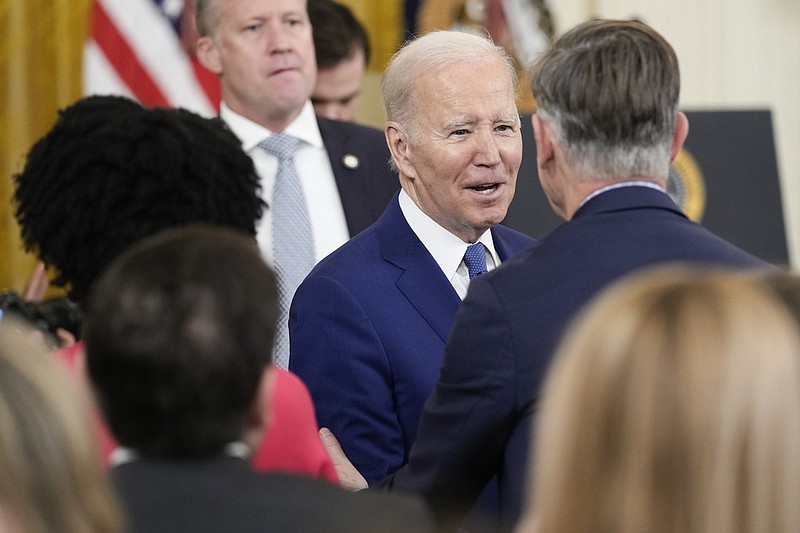WASHINGTON -- When he was vice president, Joe Biden used three words to describe then-President Barack Obama signing the signature health care law of his presidency: "big f****** deal."
Biden, now president, recalled the moment during an event Thursday at the White House celebrating the anniversary of the Affordable Care Act, a statute he described as "the most consequential piece of healthcare legislation since the creation of Medicare and Medicaid."
"I thought it was a big deal," Biden said to laughter to those attending the event in the White House's East Room. "And I stand by the fact it was a big deal."
The Affordable Care Act, signed by Obama in 2010, created multiple programs aimed at expanding health insurance access, including through subsidies and state-led Medicaid expansion efforts, and lowering health care costs.
The law -- often referred to as "Obamacare" -- additionally prohibited insurance companies from denying coverage or charging more to people with pre-existing conditions and allowed young people to stay on their parents' insurance plans until they turn 26.
When a majority of the provisions went into place in 2014, nearly 12.6 million Americans received insurance coverage through federal- or state-operated insurance marketplaces or Medicaid expansion. According to the U.S. Department of Health and Human Services, the number eclipsed 40 million this year.
Arkansas has more than 435,000 residents with insurance through the law, including 342,505 through Medicaid expansion.
"Since the law was signed by President Obama 13 years ago, it has provided life-saving protections to countless families across the state," Christen Linke Young, the deputy assistant to the president for health and veterans affairs, told the Arkansas Democrat-Gazette.
"These are critical gains. These are families who depend on the ACA for their health insurance."
The Kaiser Family Foundation -- a nonprofit health care analysis organization headquartered in San Francisco -- estimates 597,000 Arkansans have a pre-existing medical condition that would prevent them from receiving coverage if not for "Obamacare."
Arkansas was one of the first states to expand Medicaid under Obamacare, increasing the income threshold for eligibility to 138% of the federal poverty level. Before, Medicaid was mostly limited to pregnant women, children, the elderly and people with disabilities.
Robin Rudowitz, who leads the Kaiser Family Foundation's program on Medicaid and the uninsured, said people with Medicaid face less medical debt and smaller out-of-pocket costs compared to other patients, and more people can access health screenings and services as a result of expansion efforts.
Rural health care providers have additionally benefited from Medicaid expansion. The Kaiser Family Foundation released a report in February noting median operating margins in rural hospitals were greater in Medicaid expansion states than in non-expansion states, and the margins remain higher as hospitals adjust to post-pandemic conditions.
Millions of Americans, however, could lose Medicaid coverage in the coming weeks as the national coronavirus public health emergency ends. At the start of the pandemic, Congress allowed more Americans to enroll, and the federal government has prohibited states from ending coverage while the order remains in effect. The final day of the public health emergency is next Friday.
"Every person on the Medicaid program is going to have to undergo a renewal," Rudowitz said. "We know that during those times, there are some people who will remain eligible but will face barriers in their renewal process, so they may disenroll."
The Arkansas Department of Human Services began notifying people of the change in February by sending renewal packets to beneficiaries.
People ineligible for Medicaid could receive coverage through other programs, but Rudowitz said they might need assistance to find the best option.
"We've seen actual declines in the uninsured during the pandemic, mostly tied to the increases in Medicaid coverage as a result of this [emergency] provision," she said. "We'll all be watching as states implement that unwinding and how many people are disenrolled from Medicaid, but also what happens with the uninsured."
The Biden administration has built upon the Affordable Care Act; last year's Inflation Reduction Act extended enhanced Obamacare subsidies through 2025. The president has requested a permanent extension of these payments, which the White House estimates will save families $800 a year.
Biden and White House officials are anxious about the future of Obamacare, citing the current congressional makeup. After Republicans took over the House of Representatives earlier this year, some members expressed interest in reducing spending to fiscal year 2022 levels. When Biden suggested during his State of the Union address in February that some GOP members of Congress want to cut Medicare and Social Security, he was met with heckling from some House Republicans.
"We still haven't seen the House Republican budget," the president said Thursday. "They want to negotiate. I say, 'I've laid down my budget on the 9th. You lay down yours. Let's negotiate.' I don't know where their budget is."
Rudowitz said she's concerned that discussions on budget cuts and the debt ceiling will result in cuts to Medicaid and other health programs.
"There's been a focus on protecting Social Security and Medicare, and while there's been some support for including Medicaid in those protections -- more so on the Republican side -- their budgets are likely to potentially have large cuts on the Medicaid side," she said. "That just leaves states with pretty hard decisions about how to manage with lower federal dollars."
Obamacare has survived challenges and questions since its enactment 13 years ago. Congressional Republicans have tried numerous times to repeal the law. The U.S. Supreme Court has upheld it, even after Congress reduced the penalty for violating the individual mandate -- which requires people to have health insurance -- to $0.
"I do think there's the potential of Medicaid cuts, and we do not know what that might mean for expansion," Rudowitz said. "It does seem that on the 13th anniversary, the discussion is certainly not around repeal and replace like in some prior years of major efforts."

